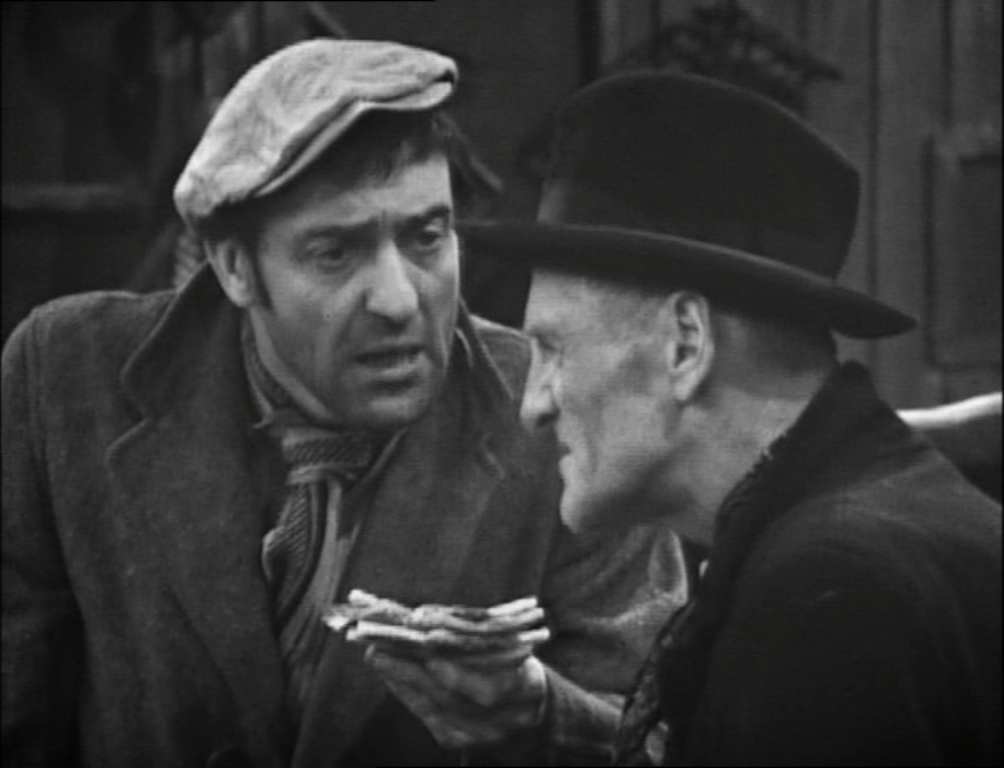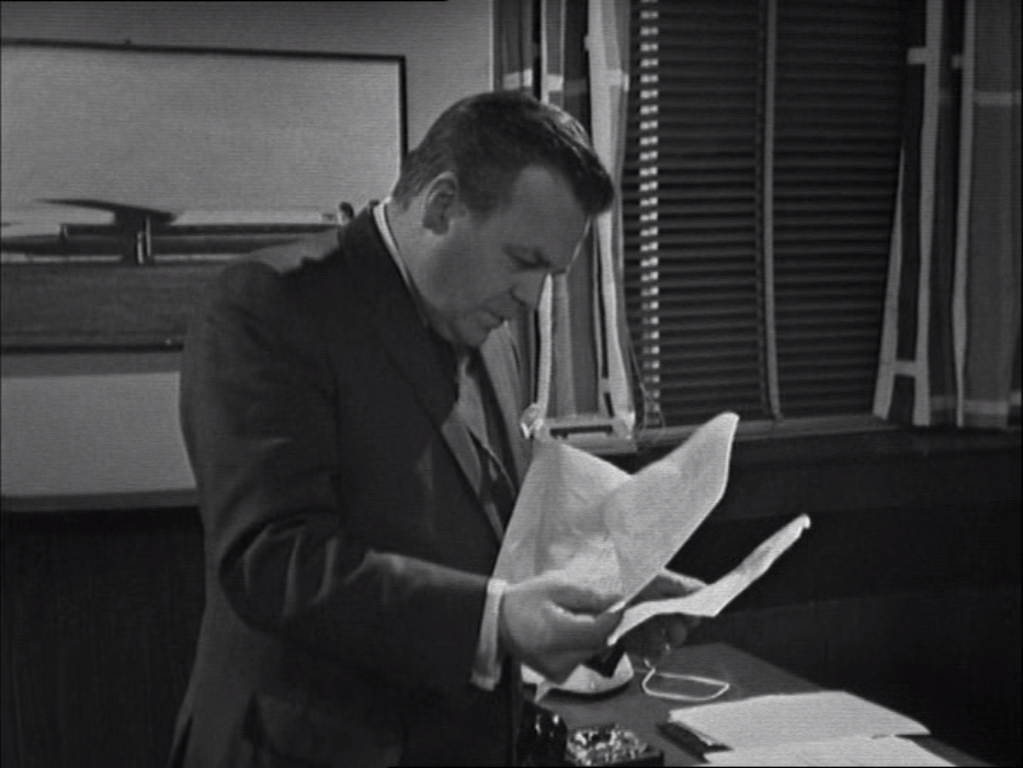Returning from a hard day of totting to the gruesome sight of his sleeping father, Harold Steptoe gives voice to what the viewer may well be thinking: "Isn't it disgusting what can happen to the human body? Can you imagine him at 20, getting a flapper worked up? I don't think he was ever 20." Harold awakens Albert with the use of an antique car horn. On the old man complaining his eardrums have been perforated Harold observes "It'd take a supersonic bang to get through the dirt in there."
Harold's "shagged out" after 13 hours of scouring the streets for saleable goods, and with the firm in dire financial straits he's been told not to go for his lunch at the caff any more: Albert's making him sandwiches instead. As the bread's entirely stale, Harold suggests the sandwiches would be better used to solve the problem of not being able to afford shoes for the horse. As for the Thermos of tea Albert's provided: "The monkeys that advertise it could make better tea than that!"
All Harold's got to show for his day's work is one lousy chair. Albert thinks they could get 30 bob for it - sadly it cost £2. Still, on a rummage behind the seat Albert finds half a dollar, a matchbox, a pencil, a hairgrip, and a liquorice allsort which he proceeds to eat.
In response to Albert's carping about Harold's uselessness, Steptoe Jr suggests they swap places, with Albert going out on the cart each day: "You look like a bundle of rags and bones, you'd be a good advert."
Harold thinks he's hit on a solution to the Steptoe's money worries: "Yesterday I had the chance of a nice gas stove... I'll go and get it, then we can put both our heads inside."
Both Steptoes are startled when Harold's Shakespeare quotation ("To sleep, perchance to dream...") is completed by a stranger. It's Leonard Rossiter, giving us a marvellous characterisation as a strange, lugubrious Welshman with two hundred weight of lead to sell: at far below the market price.
Albert's convinced it must be dodgy: Harold doesn't especially care, as long as they can make a decent profit, but accepts the lead man's highlassurances that the lead's come from his church, which is being knocked down to make way for a supermarket. The vicar's given it to him as a reward for being the longest-standing member of the flock. "I could have had the pews but I said no, no, let Mrs Trewellyn have the pews."
The next day the man provides them with a full ton of lead, which Harold pays for out of Albert's old age pension (threatening to shop him for benefit fraud if he doesn't give him the cash). For Albert it's a dark day, the end of Steptoe and Son's 85 years as an honest firm. He feels unclean. "You're not unclean," his son reassures him. "You're filthy."
Despite Harold's reassurances that the sale of the lead is all above board, a policeman turns up in the yard the next day - the terrified Steptoes hide from him, but become even more terrified when they read the note he leaves behind, about lead thieves in the area.
Scared they'll end up in prison, the Steptoes dump the lead. But that night, when it rains, they realise exactly where the lead came from...
Even more satisfying than the episode's punchline is our brief glimpse of Harold's bedroom, decorated with posters for exotic destinations just as faded and tattered as his own hopes of ever reaching them.
The Plane Makers, as its name suggests, is ostensibly about people who make planes. But during its run the show's dealt with a gratifyingly wide range of issues. Tonight's episode, focusing on the ethical problems faced by a historian working on a commercial assignment (could writer Arthur Swinson, himself a historian, have based it on experience?), is a terrific example of the show's versatility.
Michael Gwynn plays Jeremy Dobell, commissioned by John Wilder to write a history of Scott Furlong. The book's now in proof form, and has been read by Arthur Sugden, who calls Dobell in to tell him he's got the chapter on the Questor, a 1930s fighter plane, all wrong. Dobell's written that the plane was invented by K G Bennington, a Scott Furlong board member at the time. Sugden's vehemently opposed to this version of events, insisting that Bennington was in fact against the building of the Questor, which was really the brainchild of Charles Hedges, the then General Works Manager. And he should know (he says), as he worked on the Questor, and was its very first passenger. Dobell, startled by hearing all this, promises to dig deeper in order to set the record straight.
With both Bennington and Hedges dead and records from the time inconclusive, it's a case of Sugden's word vs that of Sir Frank Bennington, brother of the late board member and - this is where matters get a bit thorny - Managing Director of a company that's interested in buying five of Scott Furlong's Sovereign jets. It's good to see Ghost Squad's Anthony Marlowe around these parts once more in the role of Sir Frank, whose cluttered Victorian offices make for an interesting contrast to Scott Furlong's streamlined modernity.
Bennington's fiercely protective of his brother's reputation (he's hoping to write a book about him one day, he tells Dobell, hinting not too subtly at a ghostwriting opportunity), and as far as the ever-pragmatic John Wilder's concerned his custom's far more important than the accuracy of Scott Furlong's history. But it's clear Arthur has a huge bee in his bonnet over the issue: after hunting through masses of files he provides Wilder with documents proving Bennington had originally been opposed to the Questor, and threatens to resign if the book goes to press without Hedges receiving the credit due to him.
Dobell's home life, complete with bohemian wife (Margaret Gordon) and chess genius youngster (Alan Baulch) seems almost a satire of the middle class intellectual - especially biting in the Dobells' blithe assumption that the comparatively rough-and-ready Arthur must be mistaken about the origin of the Questor.
Wilder, increasingly troubled over the issue, calls on Miss Fergusson, keeper of the Scott Furlong archives (Geraldine Newman - Hilda from Ever Decreasing Circles! - giving a wonderful study in comic primness) to ferret out anything that can settle the matter once and for all.
But, meeting with Dobell for drinks that evening, he encourages the historian to keep to an account that gives Bennington the lion's share of the credit. Dobell manages to persuade him they should keep investigating - though at this stage it's mostly because he's intrigued by Arthur's motives in valorising Hedges.
Eventually all becomes clear: during the airshow after which Hedges was mysteriously banished from the company, Arthur happened to be flying a Questor accompanied by Hedges' fiancee. Hedges covered for him, and ever since then Arthur's felt deeply indebted to him. As far as Dobell's book's concerned, enough evidence has turned up for him to be able to push the most all-round desirable account: that Hedges and Bennington were each equally responsible in their own ways for the creation of the Questor.
As Dobell observes to his wife, in a line that should become the series' tagline: "You know, these Plane Makers, they're extraordinary people."
And finally, I should like to draw your attention to yet another brand new hairstyle sported by the fragrant Kay Lingard.


























Steptoe & Son on BBC-tv Tuesday January 21st 1964 with Harry H.Corbett & Wilfrid Brambell Guest Star,Leonard Rossiter.
ReplyDeleteThe Plane Makers on ITV with Patrick Wymark as John Wilder as Manager of Scott Furlongs and It Ran for The last Two Years.
Terry Christie,Sunderland.